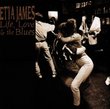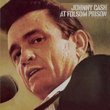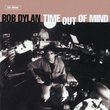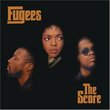| All Artists: Mavis Staples Title: We'll Never Turn Back Members Wishing: 4 Total Copies: 0 Label: Anti Original Release Date: 1/1/2007 Re-Release Date: 4/24/2007 Genres: Blues, Pop, R&B, Classic Rock, Gospel Styles: Traditional Blues, Soul, Southern Rock, Traditional Number of Discs: 1 SwapaCD Credits: 1 UPCs: 045778683024, 8714092683011, 8714092683028, 045778683062, 871409268302 |
Search - Mavis Staples :: We'll Never Turn Back
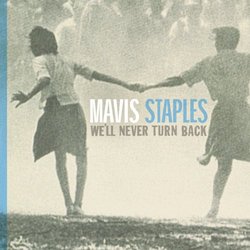 | Mavis Staples We'll Never Turn Back Genres: Blues, Pop, R&B, Classic Rock, Gospel
From the liner notes, by John Lewis: When I listen to this music, it takes me back. It takes me back to the red clay hills of Georgia, to the Black Belt of Alabama, and the Delta of Mississippi. It takes me back to the... more » |
Larger Image |
CD DetailsSynopsis
Album Description From the liner notes, by John Lewis: When I listen to this music, it takes me back. It takes me back to the red clay hills of Georgia, to the Black Belt of Alabama, and the Delta of Mississippi. It takes me back to the moans and groans and pains of an oppressed people yearning for freedom. It takes me back to the time when hundreds and thousands of us decided we were "sick and tired of being sick and tired," as Fannie Lou Hamer said. It takes me back to the days when ordinary people inspired by a dream decided to quench our hunger and thirst for justice in the fountains of mercy and love. Back then, some people thought legalized segregation in America would never come to an end. But those of us in the Civil Rights Movement were inspired by a higher calling. And even if it cost us our very lives, "we weren't gone to let nobody turn us `round". We believed that the action of peace, the way of non-violence, and the power of love could overcome our oppression and remind our oppressors of their own humanity. Through the power of this faith our nation witnessed a non-violent revolution of values, a revolution of ideas that changed America forever. The music you are listening to right now was the soul of that revolution. It was this music that gave us hope when it seemed like all hope was gone. It was the heartbeat of this music and its steady, reassuring message that bound us together as one solid force. So when we were beaten, arrested and jailed; when we stood together on picket lines or marched through the streets of the Deep South; when we faced the guns drawn, the billy clubs and the bullwhips raised; when we were teargassed, trampled by horses, or scattered by fire hoses, it was these songs that lifted us and pushed us to a higher place. It is my hope that when you hear Mavis Staples, when you hear the Freedom Singers, and the other artists on this CD, that you too will be inspired. I hope this music will help you find the courage to stand up, speak up, and speak out and answer the call of your own conscience. It is my hope that this music will help you see what ordinary people with extraordinary vision can do when they decide they will never turn back. Rep. John Lewis Similarly Requested CDs
|
CD ReviewsHold On-Keep Your Eyes On The Prize, Thank You Jesus prisrob | New EnglandUSA | 06/18/2007 (5 out of 5 stars) "It saddens me that there is a negative cabal giving this beautiful CD negative votes. They have not listened to this CD. This CD is one to savour. "This is a soulful, soulful album. Mavis Staples has a voice that is so full of faith and conviction that it just pours right out of the speakers and into your ear. About halfway through the album, you want to stand up and scream, "THANK YOU, JESUS!!! THANK YOU!" And, really... it doesn't get much better than that. Any album that can make me like a version of "Jesus Is On the Main Line" as much as the Bad Livers` is a standout in my book." Thom Jurek Mavis Staples with the assistance of Ry Cooder has produced a CD that is ageless. It is a CD that will be revered and listened to through the next millineium. She, is of course, a memeber of the Staple Singers, most often rememmbered for Pop Staples and his guitar and leadership. But, this CD, even at the age of 67 has given Mavis Staples a new life. 'We'll Never Turn Back' is a CD of songs associated with the 1960s civil-rights movement. "It's 2007, and there are still so many problems in the world," she writes of why she's revisiting songs such as 99 and ½ and Eyes On the Prize. Mavis has the Freedom Singers, join her. We'll Never Turn Back`s opening song 'Down in Mississippi' "As far back as I can remember," Staples sings, "I either had a plow or a hoe...", working in the hot Black Belt sun. Danger was everywhere--someone would go to jail for shooting a rabbit out of the hunting season, but "the season was always open on me...". Water fountains were segregated; so were "washaterias". The traditional "Eyes on the Prize" is a spiritual with Ladysmith Black Mambazo's backing vocals. The Freedom Singers begin on the album's fourth song, 'In the Mississippi River,' with Charles Neblet. The rock version of "This Little Light of Mine" makes it a new song. Mavis sings pure Southern soul in her vocal. On the popping gospel '99 1/2 Won't Do,' she goes down into the groove for inspiration and finds it there. Ry Cooder and his son, Joachim provide the back-up of great music that helps make this CD great. The longest song is 'My Own Eyes,' which Mavis wrote. It is an emotional time, recounting her journey through the civil rights movement as inspired by Dr. King. She raises her voice to sing "I saw it with my own eyes/So I know it's true," I have no doubt. Mavis indicts politicians on the failure in New Orleans. The final song is 'Jesus Is on the Main Line'and Mavis lets the graininess in her voice shine through. "Producer Ry Cooder keeps it all sounding dark and dangerous, while Staples avoids cheap slogans and hollow platitudes to soulfully deliver the straight goods on growing up under Jim Crow in Mississippi and the horrors of post-Katrina New Orleans while questioning why people are dying in a rich man's war. Her great success is making these protest songs personal, and she does it in a most profoundly moving way. This is powerful stuff." Will Hermes Mavis Staples with her father and Dr Martin Luther King started her long fight for freedom for her people many years ago. "It has been almost 50 years, how much longer will it last? Why are we treated so bad?" sings Mavis Staples. She knows the fight is long from over. Katrina was testimony to what needs to be done. She "Saw It with my Own Eyes' and we can hear the sadness and longing and need for truth from Mavis Staples own voice. She brings reality to the light. When will we all listen? Heartily, highly recommended. Listen everyday. prisrob 06-17-07 Have A Little FaithCD A Piece of the Action CD Soul to Soul (DVD with Soundtrack CD) DVD " Mavis & Cooder Meet To Tell It Like It Is Juan Mobili | Valley Cottage, NY USA | 05/25/2007 (5 out of 5 stars) "What Mavis has chosen to do in this album is to reinterpret a number of classic anthems from the Civil Rights movement as well as including several compositions of her own, all of which are impeccably rendered by an extraordinary voice which may have lost some of its youthful shine but has gained a weary wisdom and lost none of its fierce commitment to tell it like it is, without frills but plenty of class. Whether or not you share Staples' beliefs or consider yourself a long time fan of the Staples Singers, this is a phenomenal set of songs. If Mavis' voice wasn't enough the album is permeated by the magic of Ry Cooder's production who could not have been a better choice to give these songs, both, their gravitas and their groove. His guitar work in "Down In Mississippi" alone can justify buying this record. This is Cooder at his best, laying a sound as dense and ominous as a Louisiana swamp or as angelic as Gospel longings, as the songs require. Another musician worthy of note is drummer Jim Keltner, Ry's compadre for so many years, who inhabit these songs with a powerful beat that will resonate in your chest even after the album's over. Along with his work in aforementioned "Down In Mississippi"--my pick from this album for one of the best songs of 07--he's exceptional in "Eyes On The Prize" or the slow shuffle of "In The Mississippi River." All in all, this is not only a great album but a necessary one. What these songs may reawaken or introduce you to are words that have not lost their significance nor their relevance. Listen to Mavis sing those tracks already spoken for or "I'll Be Rested," "We'll Never Turn Back" or "On My Way." She'll show how much she knows about moving your soul and your body." Mavis at her best -- and that's SAYIN' somethin'. Larry D | Los Angeles, CA United States | 05/11/2007 (5 out of 5 stars) "I almost wish I could think of something negative to say about this album, just to be different. But it is transcendent. No longer the angel-voiced young girl of her early years in gospel or the sassy soul sister of the "Respect Yourself" days, Mavis is a mature woman who's seen a lot in her 60-odd years ("With My Own Eyes"). Her burnished contralto is all mid-range and lows, but if the instrument itself isn't what it once was, like Billie Holiday, Frank Sinatra, and more recently Joni Mitchell, what's lost in vocal range is more than made up for in expressiveness and nuance. No filler here, every cut is a gem. My two favorite moments in an album filled with great moments: Mavis' spoken anecdote about inadvertently integrating a Mississippi "wash-a-teria" in "Down in Mississippi" (it had been a long while since I'd last heard the term "wash-a-teria" -- that's laundromat for those of you who don't know the South); and in "I'll Be Rested", her personal vision of heaven, a combination gospel jam session and civil rights movement reunion including Dr. King and Emmett Till, Clara Ward and Marion Williams, and Mavis' own father, Pops Staples, guitar in hand. Mavis has been one of my favorite singers since the Staple Singers' epochal "Hammer and Nails" album back in 1962 (Is that album EVER going to be released on CD?); and my only hope is that this amazing collection brings Mavis a bit of the popular acclaim she so richly deserves. Better forty-five years late than never."
|

 Track Listings (12) - Disc #1
Track Listings (12) - Disc #1
